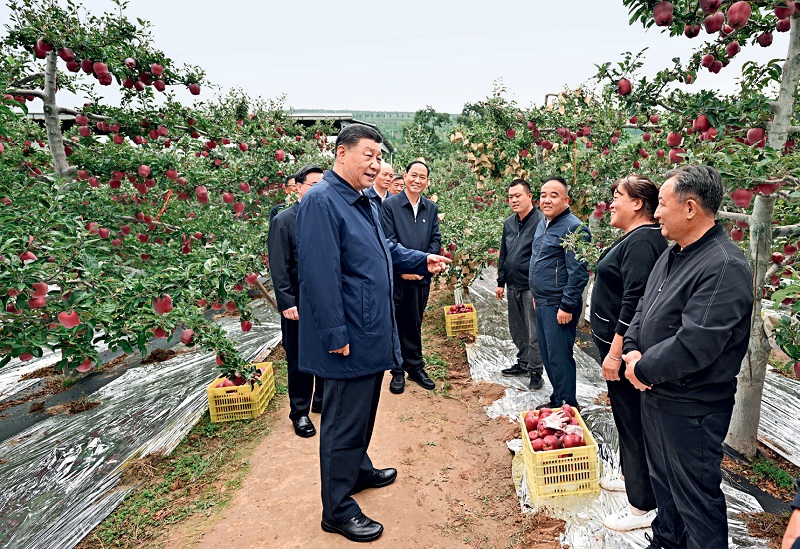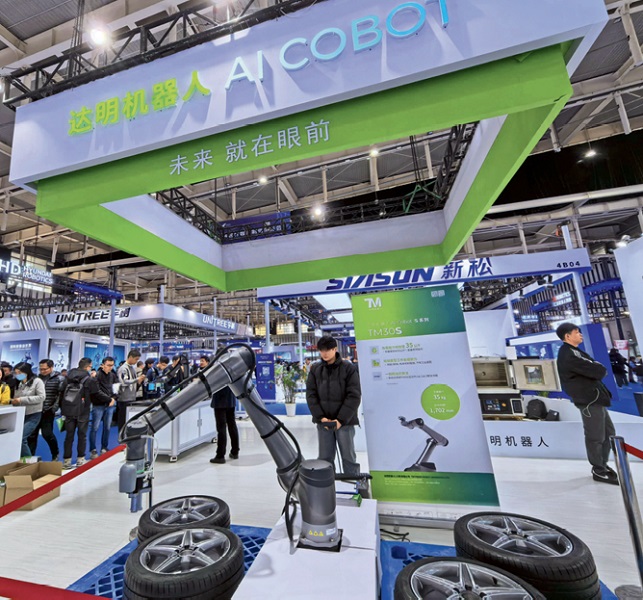President Xi Jinping’s New Year message calls for creating a better future for the world where every effort counts.
In his New Year message, President Xi Jinping called 2024 an extraordinary year with unforgettable moments.
China saw rainbows despite “winds and rains.” The economy demonstrated great resilience and showed an upward trajectory with the national GDP set to pass the RMB 130 trillion mark, meeting the preset growth target of around five percent.
The commitment to reform and opening up was renewed by the third plenary session of the 20th Central Committee of the Communist Party of China in July 2024 while new breakthroughs were made in science and technology. The Chang’e-6 lunar probe collected samples from the far side of the moon in a world first and more records were set in the exploration of stars and oceans.
Internationally, China continued to advocate building a community with a shared future for mankind and contributed to world peace and stability.
“Dreams and wishes may be far, but they can be fulfilled with dedicated pursuit,” Xi said. “The Chinese economy now faces some new conditions, including challenges of uncertainties in the external environment and pressure of transformation from old growth drivers into new ones. But we can prevail with our hard work.”

President Xi Jinping visits an apple production base to learn about the development of the modern specialty fruit industry in mountainous areas in Tianshui, northwest China’s Gansu Province, on September 11, 2024.
Hight-Quality Development
A buzzword in 2024 was “new quality productive forces.” Conceptualized by Xi, it means creating high-tech, high efficiency and high quality growth drivers free from the limitations of traditional economic growth models to advance high-quality productivity in line with China’s new philosophy of innovative, coordinated, green, and open development.
Sci-tech innovation has taken center stage in this transition. In the 2024 Global Innovation Index, the annual ranking by the World Intellectual Property Organization, China was in 11th place, up 18 spots compared to the ranking 10 years ago. Today, it has 26 of the top 100 science and technology clusters in the world, underscoring its innovation momentum.
“We have fostered new quality productive forces in light of actual conditions. New business sectors, forms and models have kept emerging. For the first time, China has produced more than 10 million new energy vehicles (NEVs) in a year. Breakthroughs have been made in integrated circuit, artificial intelligence, quantum communications and many other fields,” Xi said.
China’s NEV industry is a symbol of the green transition, fueled by the country’s innovation capacity and the government’s push for green development. From just around one percent in 2015, the NEV market share in the domestic market has surged to more than 50 percent. In July, its share surpassed that of fuel-powered vehicles for the first time.
A significant impetus came from the state-subsidized trade-in program for consumer goods. Buyers exchanging their old cars for NEVs received a RMB 20,000 subsidy, higher than the RMB 15,000 received by those buying a traditional fuel-powered car.
Corporate innovation has also played a key role. For example, electric carmaker BYD, which saw its 10-millionth NEV roll off the production line in November, will invest RMB 100 billion to upgrade its smart vehicles, integrating artificial intelligence with automotive technologies, according to a Xinhua report.
AI is transforming the manufacturing industry. China has built nearly 10,000 digitized workshops and smart factories, according to the China Internet Development Report 2024. It is the country with the largest invention patents – over 4 million.
“AI models will handle increasingly complex and refined tasks, developing unforeseen new capabilities,” said Huang Tiejun, a professor of computer science at Peking University. “In the future, AI will become foundational infrastructure, akin to water and electricity networks.”
Taizhou, a city in Zhejiang Province in east China known for its auto industry, is an illuminating case study. It is now creating other distinctions, such as a satellite super factory that manufactures 500 satellites every year. Its integrated intelligent network system, covering satellite design, research and development, production, testing, and operations, has reduced production time to 28 days per satellites. Previously it took more than one year. It has also cut costs by 55 percent.
Xi said China will implement more proactive policies, pursue high-quality development as a top priority, promote greater self-reliance and strength in science and technology, and maintain sound momentum in economic and social development.
Putting People First
Of all the jobs ahead, Xi said the most important is to ensure a happy life for the people. To ascertain whether people were leading enriched lives, in 2024, he toured the country, visiting farms, villagers’ homes and urban areas, talking to people, learning about their concerns.
In November he went to Hubei Province in central China, where he visited a vegetable farm. He urged the locals to utilize technological advancements, which would boost production and create more benefits. He also inspected the elderly care facilities and community services and called for more targeted measures to address public concerns, focusing on the needs of the elderly and children.
In October, when he was in Fujian Province, east China, Xi talked to fishermen in a village, inquiring about the dried seafood and freshly caught seafood product trade. Delighted to see the tremendous changes in the island that he had visited 23 years ago, he urged the locals to capitalize on its advantages and make good use of local marine resources.
“The countryside presents immense opportunities, and agriculture possesses significant potential,” he said.
In the western hinterland province of Gansu, Xi toured an orchard in September. It was lined with rows of ruby-red Huaniu apple trees, a specialty of the region. He spoke with the apple growers and agricultural technicians, encouraging them to make the local apple industry a greater success.
“Rural revitalization must be driven by robust industries,” he said. “Regions should build on their unique advantages and pursue development paths suited to their needs.”
In June, his destinations included the service center of a residential community in Yinchuan, the capital city of Ningxia Hui Autonomous Region in the northwest. He was briefed on the community services to facilitate residents’ daily life and cultural activities. Xi underscored the key role of communities in serving residents and stressed maintaining a stable team of warm-hearted community workers. He said communities should explore new methods to give better services.
To ensure that people live a better life, basic pension was raised in 2024, and mortgage rates decreased. Cross-province direct settlement of medical bills was expanded, making it easier to get medical treatment across the country. All these are real benefits to our people, Xi said.

The 2024 World Intelligent Manufacturing Conference commences in Nanjing, east China’s Jiangsu Province, on December 20.
For a Better World
In a world of both transformation and turbulence, China, as a responsible major country, is promoting global governance reform and deepening solidarity and cooperation among the Global South, Xi said in his New Year message.
In 2024, he visited Europe, Central Asia, and Latin America, discussing pressing issues with other dignitaries. He also attended the BRICS Summit in Kazan, Russia, and three major events in Beijing: the Conference Marking the 70th Anniversary of the Five Principles of Peaceful Coexistence, the China-Arab States Cooperation Forum, and the Forum on China-Africa Cooperation (FOCAC) Summit. At all these engagements, he advocated win-win cooperation and enhanced mutual trust.
With the rise of the developing world, “Global South” was another buzzword of 2024. Xi has frequently highlighted the importance of bringing Global South countries together. When addressing the “BRICS Plus” leaders’ dialogue in Kazan in October, he voiced strong support for Global South countries’ development and aspirations, mentioning the term 13 times.
China, a backbone force in promoting the development of the Global South, which represents over 40 percent of the world economy, will always be a member of the Global South, a reliable long-term partner of fellow developing countries, and a doer and go-getter working for the cause of global development, Xi said at the G20 summit in Rio de Janeiro in November.
China has provided development assistance to over 160 countries, and set up a Global Development and South-South Cooperation Fund, which has supported more than 150 projects.
The past year also saw China’s unwavering commitment to building a community with a shared future for mankind through high-level opening up and win-win cooperation, creating opportunities for other countries’ modernization. A notable example is the launch of the China-Serbia community with a shared future in the new era in 2024, the first of its kind in Europe. The Beijing Summit of FOCAC saw the announcement of an all-weather China-Africa community with a shared future for the new era.
Over the years, more than 100,000 freight trains have traveled between China and Europe, strengthening trade and development. Today, 155 countries have joined the Belt and Road cooperation, and 54 countries enjoy transit visa exemptions in China.
China has also been working for peace and stability in hotspot areas. On the Ukraine crisis, it has promoted peace talks. With Brazil, it issued six common understandings for a political resolution to the crisis. It has also brought other Global South countries together to launch the Group of Friends for Peace.
On the Palestinian-Israeli issue, China pushed for the adoption of the first resolution by the UN Security Council on a ceasefire in Gaza, and facilitated a reconciliation dialogue among 14 Palestinian factions, which resulted in the signing of the Beijing Declaration on Ending Division and Strengthening Palestinian National Unity.
As changes unseen in a century accelerate across the world, it is important to rise above estrangement and conflict with a broad vision and care for the future of humanity, Xi said. China will work with all countries to promote friendship and cooperation, enhance mutual learning among different cultures, and build a community with a shared future for mankind.